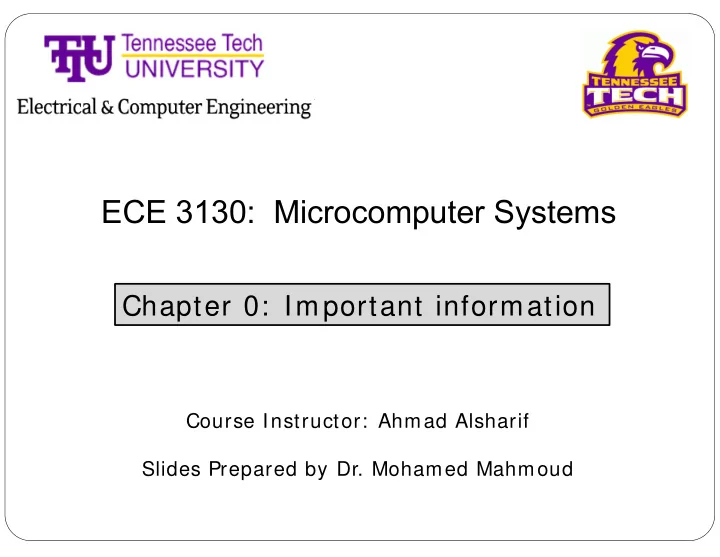

ECE 3130: Microcomputer Systems Chapter 0: Important information Course Instructor: Ahmad Alsharif Slides Prepared by Dr. Mohamed Mahmoud
1 - Course I nform ation ( 1 / 2 ) Teaching team : I nstructor: Ahmad Alsharif Office: Brown Hall – 324 E-mail: ahalsharif42@students.tntech.edu Homepage: http: / / www.cae.tntech.edu/ ~ ahalsharif42 TAs: Niclas Bewermeier nbewermei42@students.tntech.edu Wesam Al Amiri waalamiri42@students.tntech.edu Help on labs, grading, and project. Lecture: Mondays , Wednesdays 4: 40pm-6: 00pm, BRWN 320 Lab: Fridays 12: 20pm - 3: 20pm in BRWN 320 and 407 (digital lab) 0 - 1
1 - Course I nform ation ( 2 / 2 ) Course w ebsite: Any course announcements or material will be included on the web site at http: / / www.cae.tntech.edu/ ~ ahalsharif42 Frequently check this site for updates. Office hours: Tuesdays and Thursdays 10: 00 am to 11: 00 pm Do not hesitate to contact m e if you have any question or problem 0 - 2
2 - Feedback ( 1 / 1 ) I strongly welcome feedback on how to improve teaching this course. Feel free to talk to me or email me. 0 - 3
3 - Course Description ( 1 / 3 ) Prerequisites: - Number systems and codes - Boolean algebra - Digital system concepts - General programming concepts (C language) Course Outline:- Chapter 1: Microprocessor architecture Chapter 2: Assembly Programming Chapter 3: Interfacing to a microprocessor Chapter 4: Interrupts Chapter 5: Timer functions 0 - 4
3 - Course Description ( 2 / 3 ) Course Objectives: 1. Learn general concepts and terminology in computer architecture. 2. The internal organization of a typical microcontroller. 3. Analyze and design software in Assem bly and C languages for microcomputer systems. 4. Interfacing a microprocessor with I/ O devices. 5. Design interrupt service routines in Assembly and C languages. 6. Analyze and program timer functions. 7. Analyze and design hardware subsystems and interface them to microcomputer systems. 0 - 5
3 - Course Description ( 3 / 3 ) Misconception: “Assembly language is very tedious because we have to write a long code to do a small task. C language can program the microcontrollers much easier.” Response: - The main objective of the course is not only teaching a language to program the microcontroller. - The main objective is teaching how microcomputer system works. That is why the course will focus on hardware and software. - C language hides a lot of details. Assembly is the lowest level language. You deal with the hardware directly. - Assembly is used to program the subroutines used in C language. 0 - 6
4 - Course Textbook ( 1 / 1 ) Huang, Han-Way, “ The HCS12/ 9S12: An Introduction to Software and Hardware Interfacing” , Second Edition, Delmar Cengage Learning, 2010 For the purpose of this course, you do not need to buy the book. 0 - 7
5 - Course Evaluation ( 1 / 2 ) 1 - Hom ew ork: 1 0 % of final grade. 2 - Project: One project (to be done individually or in a group of two students). 1 5 % of the final grade. Up to 5 % bonus for good projects. This 5% is added to the total grade. This is a big deal. 3 - Labs: Handing out labs reports. 2 0 % of the final grade. 4 - Quizzes: multiples quizzes. 1 5 % of the final grade. 5 - Test : Two tests. 1 5 % of the final grade. 6 - Final exam : The final examination will count for 2 5 % of the final grade. 0 - 8
5 - Course Evaluation ( 2 / 2 ) - All exams are OPEN book, slides, and assignments, etc. ONLY hardcopies are allow ed - Homework : It is NOT permissible to copy solutions from others. Different from labs. - Homework, lab reports, and tests should be neat and legible. Any form of cheating will not be tolerated. 0 – 9
6 - Expectations ( 1 / 2 ) - Attend all lectures and labs: very important to understand the course. - Class participation: Your input is needed for good discussion - Fully understand the slides, lectures, and assignments - Do homework and labs by yourself - Submit organized and neat assignments and projects on time - Be on time (if you are late enter the class quiet) - Submit all the labs, homework, etc 0 - 10
6 - Expectations ( 2 / 2 ) - Begin working on the homework shortly after it is released. - Focus in classes and take good notes - Get help early if you need. I t is your responsibility to seek help from the instructor. - Begin studying the material the same day it is presented - do not accum ulate lectures – the number of slides may be large – each lecture builds on the previous ones. - Read the slides before I teach them - Not all the quizzes, labs, etc have the same weight or level of difficulty. try to get as many marks as you can in everything 0 - 11
Good Student projects https://www.youtube.com/playlist?list=PL-U0WfQeAEm7E7UljZHMmeqsX1cBjKG5S Course videos https://www.youtube.com/playlist?list=PL-U0WfQeAEm7zLeTh5OetDRFU882n9IJk 0 - 12
Questions
- Slides are protected by a password. - You do not need to type the password every time you open the files. - You can cancel the password protection after you download and open the files as follows 0 - 12
0 - 13
Recommend
More recommend